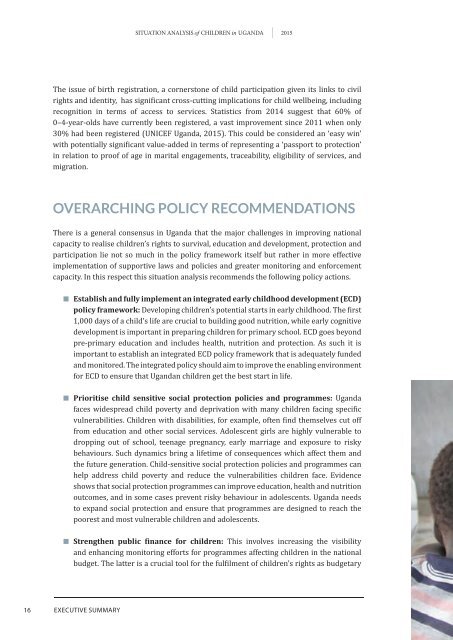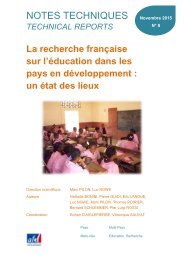Situation analySiS
1TNu802
1TNu802
Create successful ePaper yourself
Turn your PDF publications into a flip-book with our unique Google optimized e-Paper software.
<strong>Situation</strong> <strong>analySiS</strong> of Children in uganda 2015The issue of birth registration, a cornerstone of child participation given its links to civilrights and identity, has significant cross-cutting implications for child wellbeing, includingrecognition in terms of access to services. Statistics from 2014 suggest that 60% of0–4-year-olds have currently been registered, a vast improvement since 2011 when only30% had been registered (UNICEF Uganda, 2015). This could be considered an ‘easy win’with potentially significant value-added in terms of representing a ‘passport to protection’in relation to proof of age in marital engagements, traceability, eligibility of services, andmigration.OVERARCHING POLICy RECOMMENDATIONSThere is a general consensus in Uganda that the major challenges in improving nationalcapacity to realise children’s rights to survival, education and development, protection andparticipation lie not so much in the policy framework itself but rather in more effectiveimplementation of supportive laws and policies and greater monitoring and enforcementcapacity. In this respect this situation analysis recommends the following policy actions.Establish and fully implement an integrated early childhood development (ECD)policy framework: Developing children’s potential starts in early childhood. The first1,000 days of a child’s life are crucial to building good nutrition, while early cognitivedevelopment is important in preparing children for primary school. ECD goes beyondpre-primary education and includes health, nutrition and protection. As such it isimportant to establish an integrated ECD policy framework that is adequately fundedand monitored. The integrated policy should aim to improve the enabling environmentfor ECD to ensure that Ugandan children get the best start in life.Prioritise child sensitive social protection policies and programmes: Ugandafaces widespread child poverty and deprivation with many children facing specificvulnerabilities. Children with disabilities, for example, often find themselves cut offfrom education and other social services. Adolescent girls are highly vulnerable todropping out of school, teenage pregnancy, early marriage and exposure to riskybehaviours. Such dynamics bring a lifetime of consequences which affect them andthe future generation. Child-sensitive social protection policies and programmes canhelp address child poverty and reduce the vulnerabilities children face. Evidenceshows that social protection programmes can improve education, health and nutritionoutcomes, and in some cases prevent risky behaviour in adolescents. Uganda needsto expand social protection and ensure that programmes are designed to reach thepoorest and most vulnerable children and adolescents.Strengthen public finance for children: This involves increasing the visibilityand enhancing monitoring efforts for programmes affecting children in the nationalbudget. The latter is a crucial tool for the fulfilment of children’s rights as budgetary16 ExECUtIvE SUMMary




